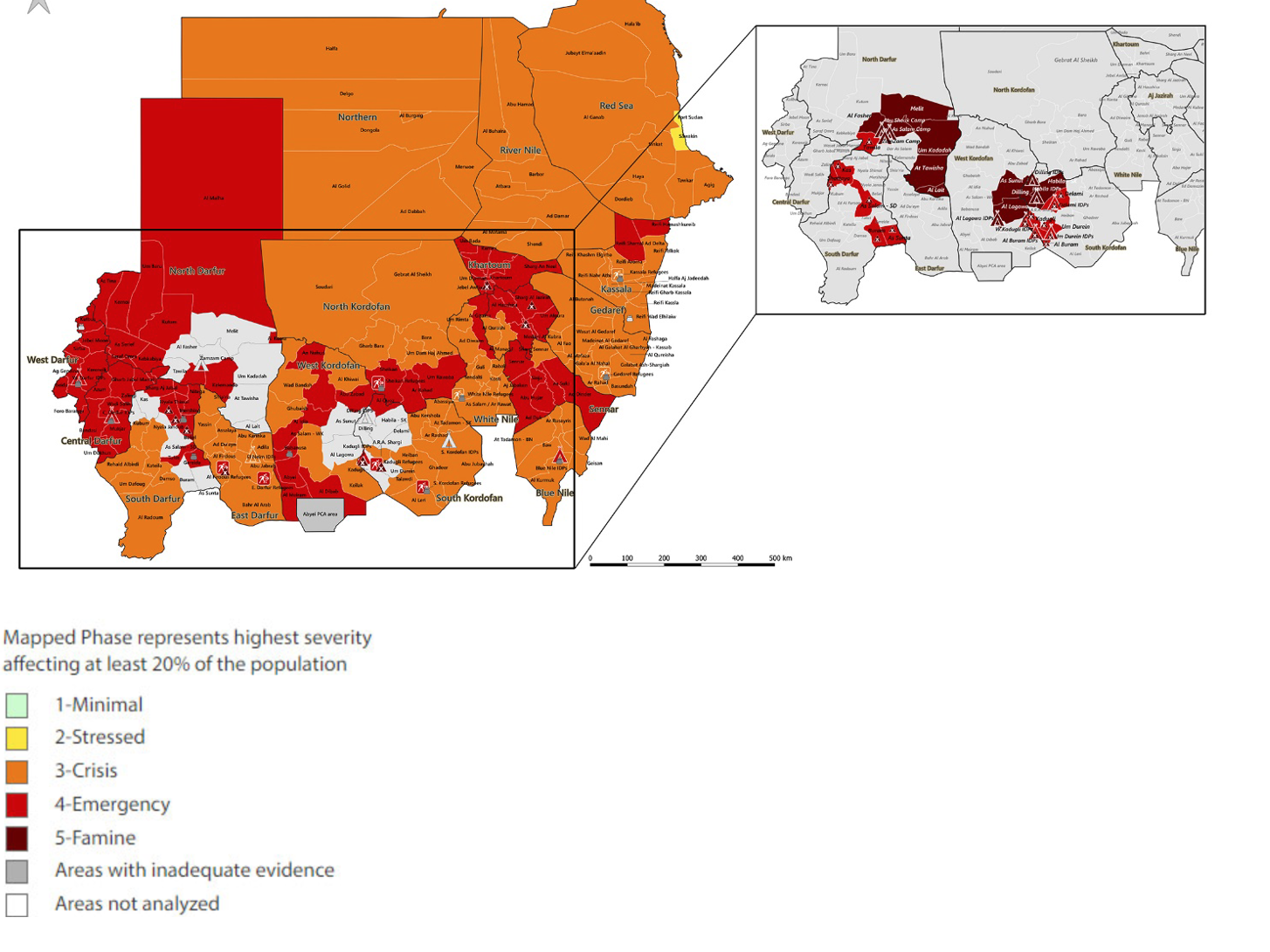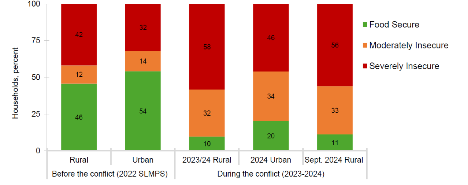Famine Continues to Spread in Sudan: New IPC Alert Released

As the conflict in Sudan enters its twentieth month, acute food insecurity in the country is spreading rapidly. According to a new alert from the IPC Famine Review Committee, Famine conditions have been identified in five areas of the country, with an additional five areas expected to face Famine between December 2024 and March 2025. As many as 17 additional areas are at risk of Famine, and half the country’s population—24.6 million people—is currently experiencing high levels of acute food insecurity. This represents a significant increase from the 21.1 million projected in the IPC Famine Review Committee’s June analysis.
Figure 1 shows both the areas in which Famine has already been declared and those in which it is expected to arise by March 2025. While Famine has thus far been confined to North Darfur and the Nuba Mountain region, other areas of the country remain at risk.
Figure 1 Acute food insecurity in Sudan, December 2024- (projected) May 2025
Source: IPC Sudan Acute Food Insecurity Oct 2024-May2025 Snapshot. https://www.ipcinfo.org/fileadmin/user_upload/ipcinfo/docs/IPC_Sudan_Acute_Food_Insecurity_Oct2024_May2025_Snapshot.pdf
More than 11.5 million people have been displaced by the conflict since it began in April 2023. This displacement of massive swathes of the population, combined with the destruction of infrastructure and widespread insecurity caused by the fighting, has limited households’ access to markets and disrupted supply chains and agricultural activities throughout the country. As a result, food prices have skyrocketed, and millions of Sudanese households are unable to meet their basic food needs.
The IPC Famine Review Committee assessment was informed in part by household survey analysis by IFPRI, confirming the sharply deteriorating food security situation in Sudan with 46% of the urban and 56% of the rural population facing severe food insecurity by September 2024, up from the already high shares of, respectively, 32% and 42% before the recent conflict broke out in 2022 (Figure 2).
Figure 2 Deteriorating household food security during the armed conflict in Sudan, 2022-2024
Source: Kirui, Oliver K.; Siddig, Khalid; Fisher, Monica; Abushama, Hala; Ahmed, Mosab; Raouf, Mariam; and Taffesse, Alemayehu Seyoum. 2024. Evolution of food insecurity in Sudan during the ongoing conflict. Sudan Strategy Support Policy Note 8. Washington, DC: International Food Policy Research Institute.
Further exacerbating this dire food security situation is the fact that humanitarian aid has been severely restricted. This includes not only food aid but also water, health and sanitation services, and other vital services.
The latest IPC alert emphasizes that Famine represents “ . . . a catastrophic collapse of the systems and resources essential for survival . . . a profound breakdown of health, livelihoods, and social structures . . .”
Addressing this catastrophic failure will require the cessation of hostilities, first and foremost. Opening up border crossings and airspace to both humanitarian aid and commercial deliveries—and ensuring the safety of those access routes—will also be key in ramping up both the availability of and access to food and other essential goods.
Ensuring access to functioning telecommunications networks to restore the flow of remittances into Sudan and access to banking and credit institutions is also needed to help households rebuild. Households will also need support through targeted interventions aimed at rebuilding their agricultural livelihoods and increasing their resilience to future shocks.
Finally, continued and enhanced data collection is essential to fully understand the rapidly evolving food and nutrition security situation in Sudan. This includes conducting food and nutrition security surveys, similar to the surveys conducted by IFPRI that informed the latest IPC Famine Review Committee work and supported its findings of rapidly deteriorating food security, in areas where conditions have not yet been assessed.
The government of Sudan, which is a party to the conflict, has indicated that it rejects the IPC assessment and is no longer wishes to collaborate with the IPC process.
Sara Gustafson is a freelance communications consultant. Rob Vos is a Senior Research Fellow in IFPRI's Markets, Trade, and Institutions Unit.

